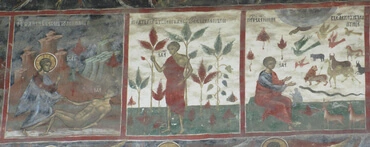Explanation of Genesis 2:18
Door Brian David

The Bible often describes a person, church or nation as being "alone" to indicate that it is celestial in nature – that is, that it is motivated by love to the Lord and led in life directly by the Lord, and is thus not surrounded by the temptations of evil and falsity. This was the case with the Most Ancient Church, which is represented by "man" or "Adam." But it would not stay that way.
Eventually – most likely over many generations – people began to want to lead themselves and think for themselves rather than being led by the Lord in life and thought. They wanted to connect more directly with the world. They didn't want to be "alone" anymore. In doing this they turned away from their highest, most blessed state – represented by the statement "it is not good."
So the Lord prepared to grant them their wish, by preparing to give them a "helper" – a sense of life as their own, which is described further in the discussion of Gen. 2:22.
(Referenties: Arcana Coelestia 138, 139, 140)
Arcana Coelestia #151
151. Verse 22 And Jehovah God built the rib which He took from the man into a woman, and brought her to the man.
'Building means reconstructing that which has fallen down, 'rib' the proprium that has not been given life, 'woman the proprium that has been given life by the Lord, 'bringing her to the man' that a proprium was granted to him. Since the descendants of this Church, unlike their ancestors, did not wish to be the celestial man, but to be their own guides and so set their heart on the proprium, they were allowed to have one. It was however a proprium given life by the Lord, which is why it is called 'a woman', and after that 'a wife'.






